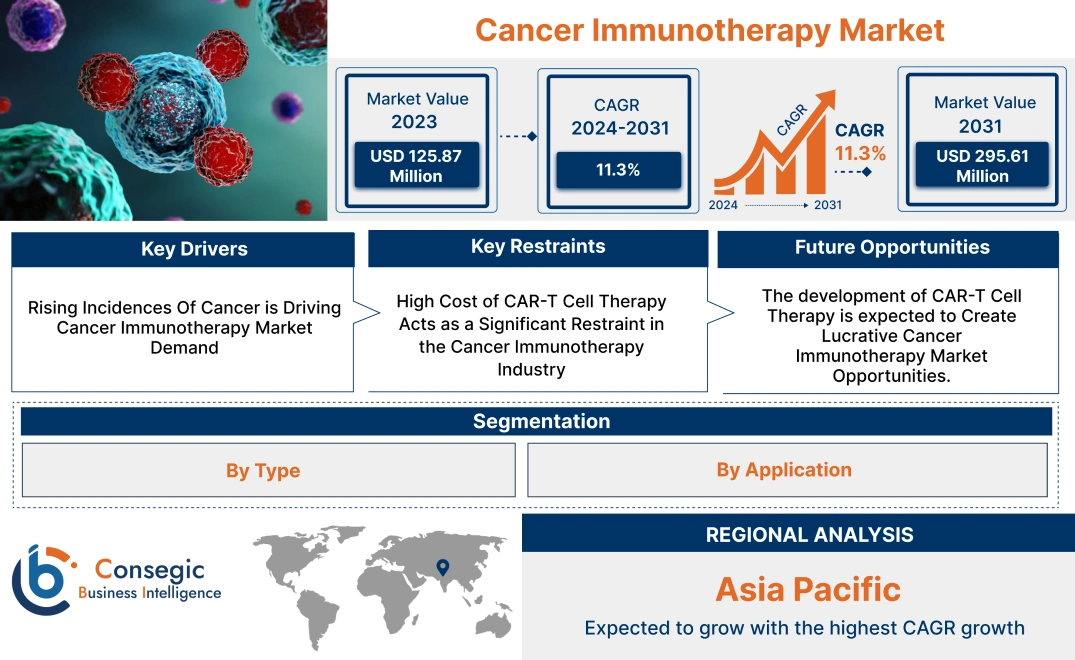Cancer Immunotherapy Market Size:
Cancer Immunotherapy Market size is estimated to reach over USD 295.61 Billion by 2031 from a value of USD 125.87 Billion in 2023, growing at a CAGR of 11.3% from 2024 to 2031.
Cancer Immunotherapy Market Scope & Overview:
Cancer immunotherapy is a type of cancer treatment that uses the body's own immune system to fight cancer. It works by boosting or changing the way the immune system works so that it can recognize and attack cancer cells. This can be done in a variety of ways, such as by using antibodies, vaccines, or other substances that stimulate the immune system. There are various types of immunotherapies such as Monoclonal antibodies (MABs), Checkpoint Inhibitors, Vaccines, CAR T-cell therapy, and others. Benefits of this immunotherapy include better treatment, fewer side effects, less return rate of cancer, and others. It is used to treat melanoma skin cancer, non–small cell lung cancer, kidney cancer, Hodgkin lymphoma, and others. There have been recent developments in the market such as the use of novel therapies like adaptive cell therapy, CD8+ immunotherapy, and CART-cell therapy which are providing effective treatments in cancer patients driving overall demand.
Cancer Immunotherapy Market Dynamics - (DRO) :
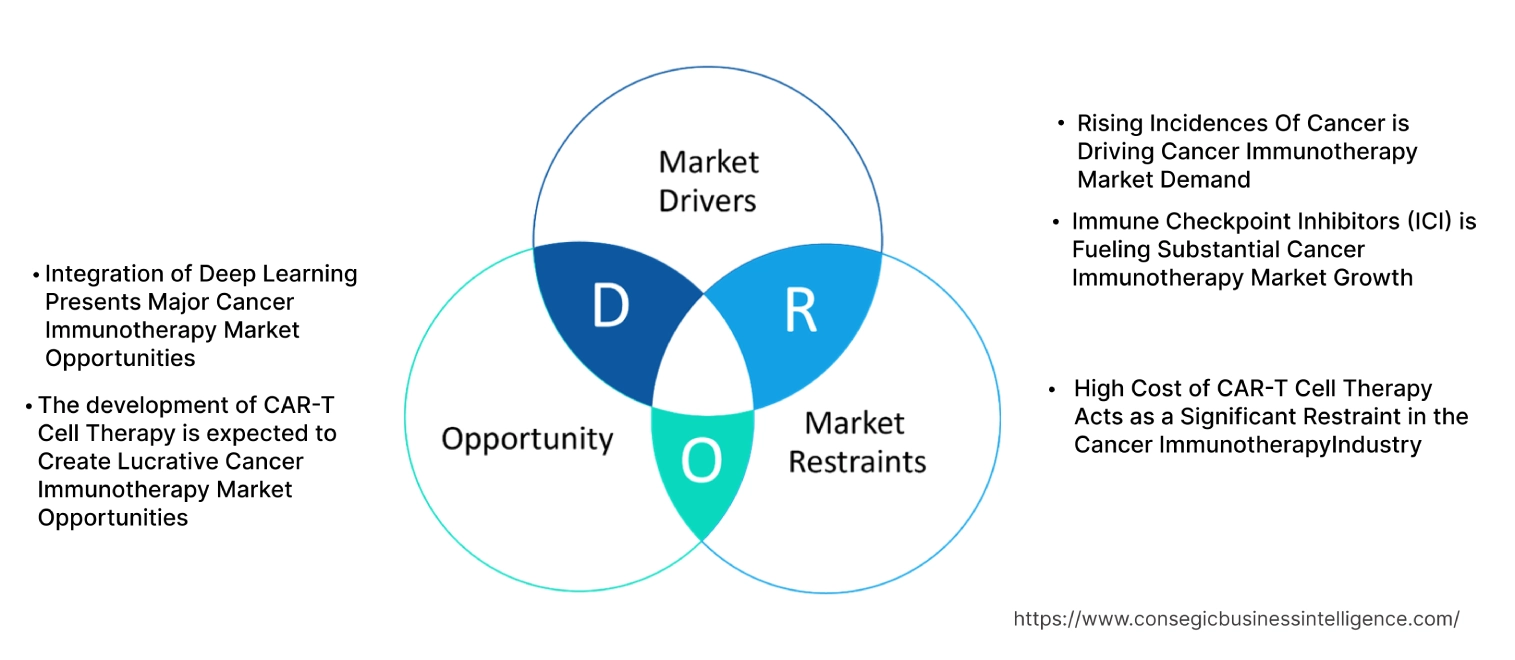
Key Drivers:
Rising Incidences Of Cancer is Driving Cancer Immunotherapy Market Demand
Cancer remains one of the most prevalent diseases globally, impacting millions of lives each year. The increasing number of new cancer cases worldwide has led to a surge in the demand for the market. Cancer Immunotherapy is a treatment that uses a person's immune system to eliminate cancer.
- According to the National Cancer Institute, in 2022, there were almost 20 million new cases and 9.7 million cancer-related deaths worldwide. By 2040, the number of new cancer cases per year is expected to rise to 29.9 million.
Thus, the increasing prevalence of cancer globally is directly fueling cancer immunotherapy market demand by offering effective treatment options of treatment for cancer patients.
Immune Checkpoint Inhibitors (ICI) is Fueling Substantial Cancer Immunotherapy Market Growth
Immune checkpoint inhibitors (ICI) are one of the types of cancer immunotherapy that have advanced cancer treatment by blocking proteins that inhibit the immune response. This enables the immune system to recognize and attack cancer cells more effectively. This remarkable approach has also been approved by the FDA for further use in cancer treatment.
- In 2022, according to the Journal of Current Oncology, the US FDA has successfully approved three different categories of immune checkpoint inhibitors (ICIs) namely PD-1 inhibitors (Nivolumab, Pembrolizumab, and Cemiplimab).
Thus, the rise of immune check inhibitors in the cancer immunotherapy industry is creating demand for cancer treatment strategies.
Key Restraints :
High Cost of CAR-T Cell Therapy Acts as a Significant Restraint in the Cancer Immunotherapy Industry
The market has seen many advances recently, but high cost limits the market. Immunotherapies like CAR-T-cell therapies are costing more to the patients, limiting cancer treatments in some cases. Higher cost also places financial burdens on healthcare providers and insurance systems to provide effective treatment to cancer patients.
- According to the Journal of Frontiers in Immunology, cancer immunotherapies typically cost more than $100,000 per patient and the cost of CAR-T-cell therapies to treat B-cell lymphoma is $373,000.
Thus, the high cost of immunotherapy treatments is a significant barrier to the market, as it restricts access for many cancer patients to cancer treatment.
Future Opportunities :
The development of CAR-T Cell Therapy is expected to Create Lucrative Cancer Immunotherapy Market Opportunities.
The development of novel cancer immunotherapy such as chimeric antigen receptor-modified T (CAR-T) cell therapy has been considered a new advancement in cancer treatment. It uses immune cells called T cells that are genetically altered in a lab to enable them to locate in destroy cancer cells more effectively. This CAR-T Cell Therapy is effective in patients with different types of tumors such as lung tumors, and epithelial tumors, among others.
- In 2024, according to Science Advances, CAR-T cell immunotherapy is safe and efficacious for epithelial tumors. It exhibited robust antitumor activity without adverse effects in patients.
Thus, advances in immunotherapy such as chimeric antigen receptor-modified T (CAR-T) cell therapy present major opportunities in the cancer immunotherapy industry.
Integration of Deep Learning Presents Major Cancer Immunotherapy Market Opportunities
Deep learning is a type of machine learning that uses artificial neural networks to learn from complex data sets. By using advanced data analytics this deep learning enhances various aspects of the market from drug discovery and patient selection to treatment personalization and immunotherapies efficacy prediction. It also helps to predict the expression of Programmed cell death protein-1 ligand (PD-L1) which is an important prognostic predictor for immunotherapy of non-small cell lung cancer (NSCLC).
- In 2024, according to the European Journal of Radiology Open, deep learning and radiomics models based on positron emission tomography and computed tomography (PET/CT) accurately predict Programmed cell death protein-1 ligand PD-L1 expression in non-small cell lung cancer. It shows how cancer immunotherapy will impact the cancer cells in patients.
Thus, the integration of deep learning in cancer immunotherapy signifies a pivotal shift towards more efficient, personalized, and improved cancer treatment.
Cancer Immunotherapy Market Segmental Analysis :
By Type:
Based on type, the market is divided into Monoclonal antibodies (MABs), Immune Checkpoint Inhibitors, Vaccines, CAR T-cell therapy, and others.
Trends in the type:
- In the latest cancer immunotherapy market trends, Monoclonal Antibodies are showing major innovation by introducing novel antibodies for cancer treatments.
- There has been growth in the use and clinical trials of immune checkpoint combination therapies, as per trends.
Monoclonal antibodies (MABs) account for the largest cancer immunotherapy market share by type.
- Monoclonal antibodies (MABs) are a type of immunotherapy that works by triggering the immune system and helping it to attack cancer.
- Monoclonal antibody therapies mimic natural antibodies but are made in a laboratory.
- Monoclonal antibody works by recognizing and finding specific proteins in cells. Some work on cancer cells and others target proteins in cells of the immune system. They work in different ways depending on the protein they are targeting.
- In 2022, Genuv Teams collaborated with Nanocarry Therapeutics to Develop further developments in GNUV201. GNUV201 is a novel human reactive and low pH-selective anti-programmed cell death protein-1 ligand(PD-L1) monoclonal antibody for immunotherapies used in cancer treatments.
- Thus, monoclonal antibodies are experiencing major growth by introducing newer approaches.
Immune checkpoint inhibitors of this type are expected to grow at the fastest CAGR over the forecast period.
- Immune checkpoint inhibitors are a type of immunotherapy that block immune checkpoint proteins from binding with partner proteins.
- Immune checkpoint inhibitors are approved to treat a variety of cancers including breast cancer, bladder cancer, cervical cancer, and others.
- Various Immune checkpoint inhibitors have been approved by FDA for further use in cancer treatment.
- In 2022, The Food and Drug Administration (FDA) approved a combination of two immunotherapy drugs namely relatlimab and nivolumab (Opdivo) and will be marketed under the name Opdualag, both of which are immune checkpoint inhibitors for the treatment of cancer.
- Thus, Immune checkpoint inhibitors are experiencing rapid growth due to their efficiency in cancer treatment and will see the proliferation in future trends.
By Application:
Based on the application, the market is divided into skin cancer, lung cancer, breast cancer, bladder cancer, and others.
Trends in the Application:
- In cancer immunotherapy market trends, Several immunotherapies like Immune checkpoint inhibitors and Immunomodulators are used in the treatment of skin cancers.
- The use of immunotherapies in lung cancer treatments is exhibiting promising results according to trends.
Skin Cancer accounts for the largest cancer immunotherapy market share of 38.20% by application.
- Early-stage skin cancers that remain localized are often successfully treated through a variety of surgical techniques as well as radiation therapy, photodynamic therapy, and topical chemotherapy.
- For advanced cases beyond surgery, there are several immunotherapies available such as Immune checkpoint inhibitors and Immunomodulators named pembrolizumab (Keytruda®) and Aldesleukin (Proleukin®) respectively.
- In 2024,Nucleai Highlights AI-Powered Spatial Biomarker Breakthroughs to Enhance the Immunotherapy Success for Lung and Skin Cancer Patients at the Society for Immunotherapy of Cancer (SITC) 2024 Annual Meeting.
- Thus, the use of immunotherapy in skin cancer treatments is experiencing growth due to its efficiency and fewer side effects.
Lung cancer in the application segment of cancer immunotherapy is expected to grow at the fastest CAGR over the forecast period.
- Cancer immunotherapy works differently than other lung cancer treatments like traditional chemotherapy, targeted therapy, and radiation.
- Immune checkpoint inhibitors are one such type of cancer immunotherapy that has been used progressively to treat lung cancer.
- Also, Bispecific T-cell Engager (BiTE®) Therapy is another type of cancer immunotherapy that is used to treat extensive-stage small cell lung cancer (SCLC).
- In 2024, Cofactor Genomics announced the launch of OncoPrism®-NSCLC, an RNA-based diagnostic to predict response to cancer immunotherapy in non-small cell lung cancer (NSCLC) patients. It uses pre-treatment tumor biopsies to predict response to immunotherapy and is tested in Cofactor's laboratory.
- Therefore, the use of immunotherapies in lung cancer treatments is showing positive results making it potential for use in current trends.
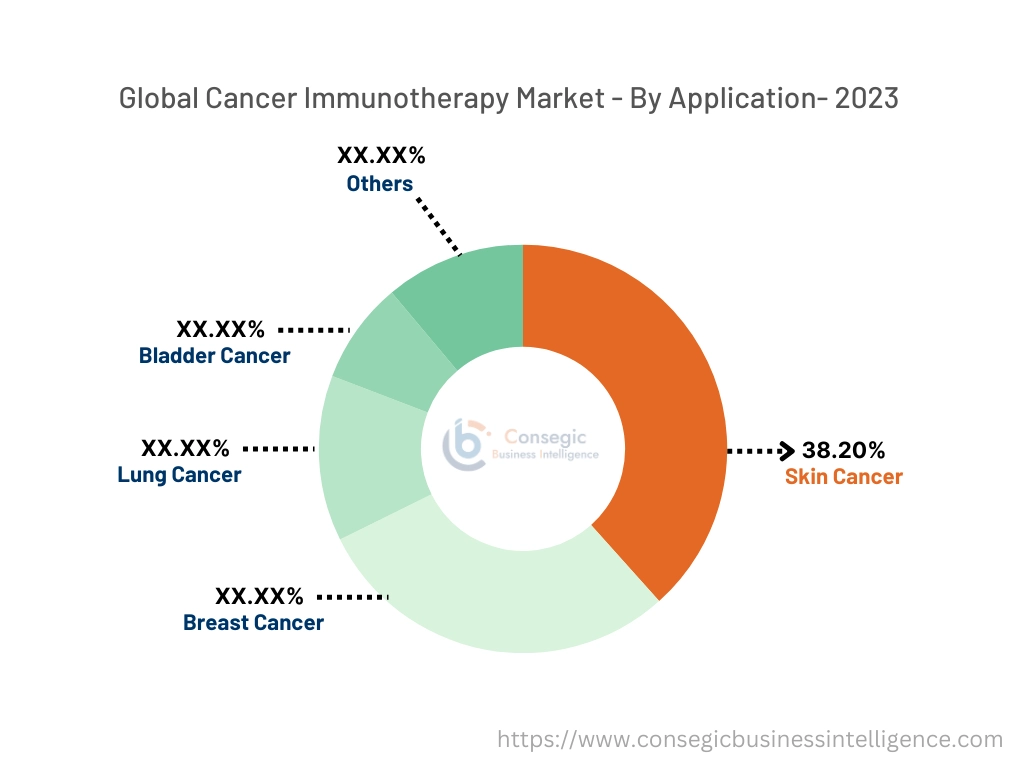
Regional Analysis:
The regions covered are North America, Europe, Asia Pacific, the Middle East and Africa, and Latin America.
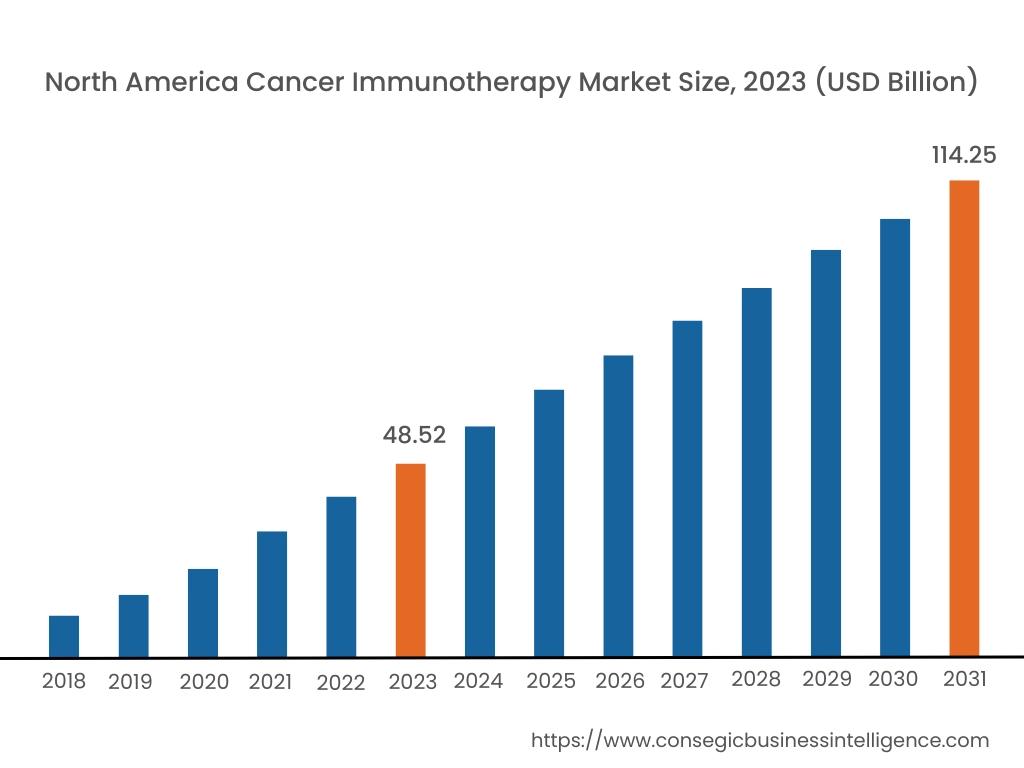
In 2023, North America accounted for the highest market share at 38.55% and was valued at USD 48.52 Billion, and is expected to reach USD 114.25 Billion in 2031. In North America, the U.S. accounted for the highest market share of 66.50% during the base year of 2023. As per cancer immunotherapy market analysis, North America's dominance in cancer immunotherapy is supported by the rising number of cancer hospitals, advanced machinery, and government funding for cancer research and development. Additionally, this immunotherapy is covered by private insurance, Medicare, or Medicaid in the USA. Key immunotherapy approaches include checkpoint inhibitors for melanoma and lung cancers, CAR-T-Cell therapy for certain blood cancers, and innovative methods like oncolytic virus therapy and cancer vaccines.
- According to the Cancer Research Institute, as of March 2022, the U.S. Food and Drug Administration had approved over 60 immunotherapies that together cover almost every major cancer type.
Thus, advancements in immunotherapies and approval from the FDA have made North America a leading region in the transformative field of cancer immunotherapy.
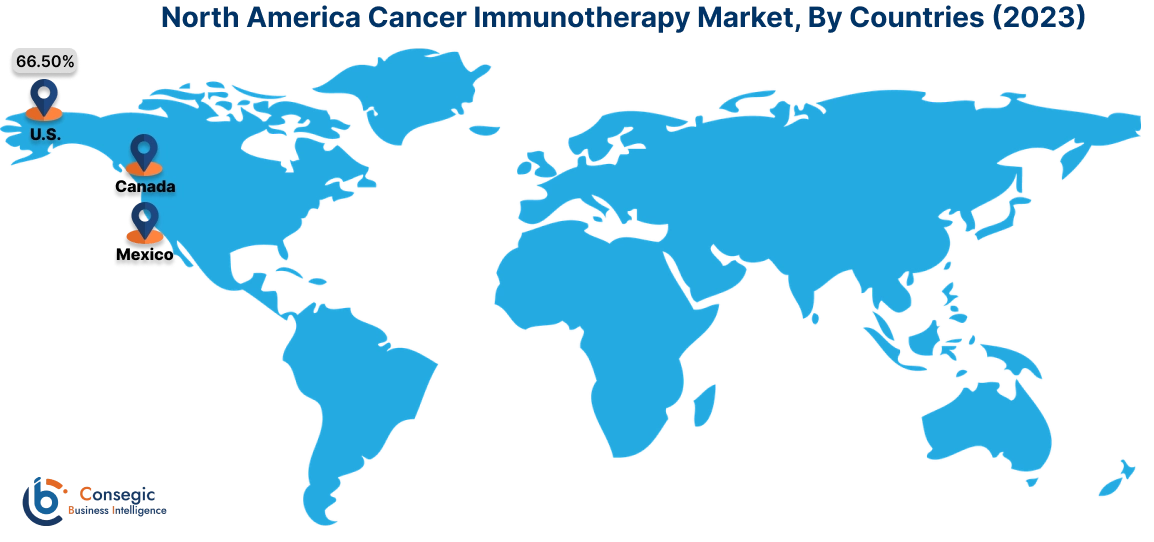
Europe is expected to witness the fastest CAGR over the forecast period of 11.8% during 2024-2031. According to cancer immunotherapy market analysis, in Europe, cancer immunotherapies have become a critical focus, with advancements offering new treatments and improving patient outcomes, particularly for advanced and resistant cancers. Moreover, European research institutions and collaborative networks, such as the European Society for Medical Oncology (ESMO) and the Innovative Medicinal Initiative (IMI) are actively involved in clinical trials and developing innovative approaches including cancer vaccines and oncolytic virus therapies.
- In August 2023, Roche's Tecentriq® (atezolizumab) cancer immunotherapy received new European Union approval for subcutaneous injection. It is the first PD-(L)1 immunotherapy approved in Great Britain.
Therefore, European researchers and healthcare providers continue to expand immunotherapy applications, making it a growing pillar of cancer treatments as per the analysis.
In the Asia-Pacific region, cancer immunotherapy market growth is increasing, driven by the increasing prevalence of cancer, early diagnosis, advancement in biotechnology, and rising healthcare spending. Adoption of immunotherapy is progressing, especially in countries like Japan, China, and South Korea, which are leading in research and development. These nations have approved various immunotherapies, including checkpoint inhibitors and CAR-T cell therapies, and are conducting numerous clinical trials, often supported by government initiatives. However, challenges such as the high cost of immunotherapy and limited access to advanced treatments in some regions remain barriers. Despite this, this region holds immense potential for cancer immunotherapy market expansion and innovation in cancer immunotherapies as per the analysis.
In the Middle East and Africa, the market is steadily growing due to the rising prevalence of cancer, increasing healthcare investment, government support, and advancement in healthcare infrastructure. It gradually becoming available, primarily in nations like UAE and Saudi Arabia, where advanced hospitals and government organizations provide access to treatments such as immune checkpoint inhibitors. However, the market faces challenges such as high treatment costs, limited access to advanced therapies in low-income countries, limited cancer awareness, and insufficient hurdles. Despite these hurdles, increased healthcare funding and medical tourism are expected to boost cancer immunotherapy market expansion in the Middle East and Africa region as per the analysis.
In Latin America, cancer immunotherapies are growing steadily, fueled by the rising incidence of cancer, improving healthcare infrastructure, and increasing adoption of advanced therapies. Key factors driving growth include a higher prevalence of cancers such as lung, eye, breast, and colorectal due to lifestyle changes and the aging population. Governments and healthcare organizations are making significant efforts to enhance cancer care through funding and partnerships with global pharmaceutical companies. However widespread access remains limited due to economic constraints and efforts are ongoing to improve affordability and integration into public healthcare systems. Also, rising awareness and public-private collaborations are expected to propel the market forward as per the analysis.
Top Key Players & Market Share Insights:
The cancer immunotherapy market is highly competitive with major players providing products and services to the national and international markets. Key players are adopting several strategies in research and development (R&D), product innovation, and end-user launches to hold a strong position in the global cancer immunotherapy market. Key players in the cancer immunotherapy industry include-
- Bristol-Myers Squibb (United States)
- AstraZeneca (United Kingdom)
- Elicio Therapeutics (United States)
- F. Hoffmann-La Roche Ltd (Switzerland)
- Merck & Co., Inc. (United States)
- Novartis AG (Switzerland)
- Pfizer Inc. (United States)
- Amgen Inc. (United States)
- Elli Lilly and Company (United States)
- Cellectis (France)
Recent Industry Developments :
Innovations:
- In June 2024, AstraZeneca's Imfinzi is the first and only cancer immunotherapy to show survival benefit in limited-stage small cell lung cancer in a global Phase III trial, reducing the risk of death by 27%. Imfinzi (durvalumab) is a human monoclonal antibody that binds to the PD-L1 protein and blocks the interaction of PD-L1 with the PD-1 and CD80 proteins, countering the tumor's immune-evading tactics and releasing the inhibition of immune responses.
- In May 2024, according to the National Cancer Institute, Pembrolizumab is the First immunotherapy drug to improve overall survival in kidney cancer. The Food and Drug Administration (FDA) approved pembrolizumab in 2021 as a supportive treatment for kidney cancer.
Collaborations:
- In 2021, Boehringer Ingelheim and Enara Bio enter into a strategic collaboration and licensing agreement to discover novel shared antigens for cancer immunotherapies. This new collaboration combines Boehringer Ingelheim's approach to innovative immune-oncology platforms, such as oncolytic viruses and cancer vaccines, with Enara Bio's Dark Antigen™ discovery platform. The aim is to provide potential new immunotherapies for patients with difficult-to-treat lung and gastrointestinal cancers.
Cancer Immunotherapy Market Report Insights :
| Report Attributes | Report Details |
| Study Timeline | 2018-2031 |
| Market Size in 2031 | USD 295.61 Billion |
| CAGR (2024-2031) | 11.3% |
| By Type |
|
| By Application |
|
| By Region |
|
| Key Players |
|
| North America | U.S. Canada Mexico |
| Europe | U.K. Germany France Spain Italy Russia Benelux Rest of Europe |
| APAC | China South Korea Japan India Australia ASEAN Rest of Asia-Pacific |
| Middle East and Africa | GCC Turkey South Africa Rest of MEA |
| LATAM | Brazil Argentina Chile Rest of LATAM |
| Report Coverage |
|
Key Questions Answered in the Report
How big is the Cancer Immunotherapy Market? +
Global Cancer Immunotherapy Market size is estimated to reach over USD 295.6 Billion by 2031 from a value of USD 125.87 Billion in 2023, growing at a CAGR of 11.3% from 2024 to 2031.
What specific segmentation details are covered in the Cancer Immunotherapy Market report? +
The Cancer Immunotherapy Market report includes specific segmentation details for type and application.
Which is the fastest-growing region in the Cancer Immunotherapy Market? +
Europe is the fastest-growing region in the Cancer Immunotherapy Market.
Who are the major players in the Cancer Immunotherapy Market? +
The key participants in the Cancer Immunotherapy market are Bristol-Myers Squibb (United States), AstraZeneca (United Kingdom), Elicio Therapeutics (United States), F. Hoffmann-La Roche Ltd (Switzerland), Merck & Co., Inc. (United States), Novartis AG (Switzerland), Pfizer Inc. (United States), Amgen Inc. (United States), Elli Lilly and Company (United States), Cellectis (France).
